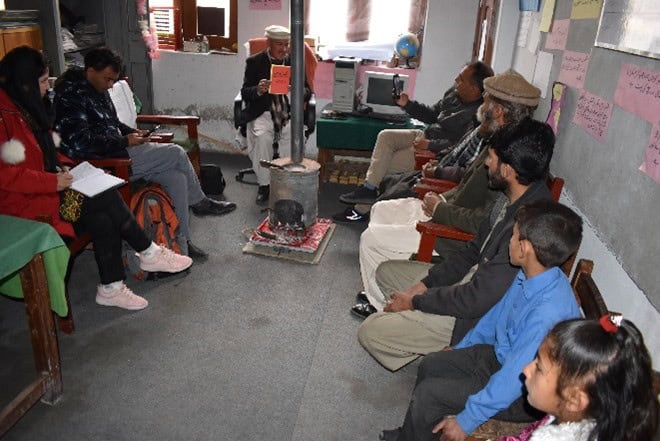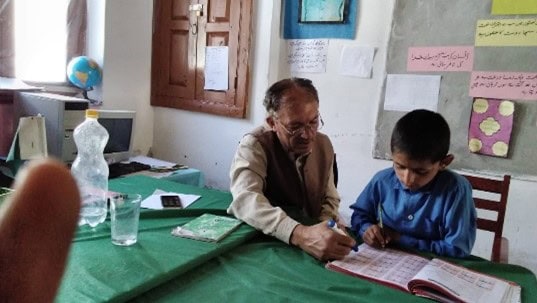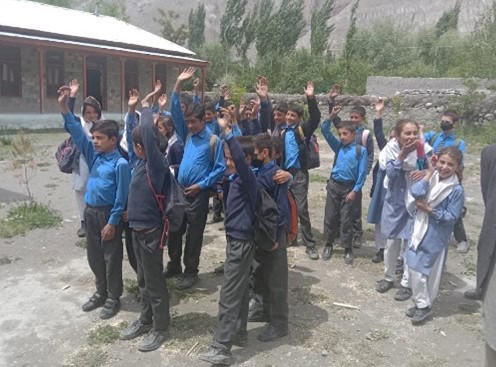In the remote Ishkoman Valley of Gilgit Baltistan of Pakistan, where harsh landscapes and seasonal migrations shape everyday life, schools face unique challenges. Afzal Khan is a teacher at Government Primary School Tushkin, which serves the children of a community that migrates twice a year for herding. As a result, the school struggles with severe and consistent absenteeism. Thanks to his leadership, combined with the support of the Schools2030 programme, Afzal and his colleagues have identified the root causes of the issue and implemented innovative solutions, leading to profound results.
The Challenge: Chronic Absenteeism
Afzal Khan’s school serves the children of nomadic families, who relocate twice a year—once to the high pastures during summer, and then back to the village in winter. These students belong to some of the most underprivileged families in the region. Their parents, occupied with herding animals, often can’t prioritise their children’s education, partly due to their own illiteracy and socioeconomic challenges. Cultural and religious barriers have also limited communication between teachers and mothers, making it difficult to address the problem effectively. At the time, the school faced staggering absenteeism rates, with 50-60% of students absent each day.
Baseline Data and Initial Insights
Afzal was introduced to the Schools2030 design thinking methodologies and assessment tools that provided insights into both academic and non-academic student needs, revealing the real depth of the problem. Students, on average, were only attending 10-12 days per month, leading to significant learning gaps. Traditional methods to address absenteeism— such as fines and punishments —had failed to yield success. It became clear that the root causes of the problem were far more complex, requiring a different approach.
“When Schools2030 first approached us to join the programme, we were hesitant. I thought we might not be able to cope with the new methods. But once we got involved, I realised this was the opportunity we needed to address our biggest challenges.”
Afzal Khan, Teacher at Government Primary School Tushkin

Human-Centred Design: A New Holistic Approach
The Human-Centred Design (HCD) approach focuses on empathy and collaboration, placing the students and their families at the centre of the solution. To understand the root causes, the school employed a variety of methods, including interviews with students and engaging female teachers to communicate with mothers. Meetings were held with the School Management Committee, which had been largely inactive, and new communication channels with parents were established.
The data revealed that absenteeism wasn’t solely due to the migratory lifestyle of the families. The team identified several additional factors: extreme poverty, parental illiteracy, large households, and a lack of awareness about the importance of education.
“Before, we didn’t even realise the importance of looking beyond academic performance. The tools helped us to diagnose the problem; that our students were only in school for 10-12 days a month.”
Afzal Khan, Teacher at Government Primary School Tushkin
With a clearer understanding of the problem, Afzal Khan and his team implemented a series of targeted interventions, taking a holistic approach to the problem. These included regular meetings with parents, home visits, and the creation of more efficient communication systems, such as contact diaries and updated parent phone numbers. The school also held separate sessions for fathers and mothers to respect cultural and religious sensitivities while keeping parents informed about their children’s attendance and academic progress.
The introduction of monthly tests and a consistent feedback mechanism helped evaluate the effectiveness of these interventions, allowing for continuous adaptation based on the evolving needs of the school community.

The Results
In just three months, Afzal Khan’s leadership led to a dramatic improvement in student attendance — from 34% to 62%. Parental involvement surged with more parents attending school meetings and regularly checking on their children’s progress. Parent-teacher meeting attendance increased to over 70%, building a stronger connection between the school and the community.
The learning environment also saw significant improvements, bolstered by Early Childhood Development materials and resources. This, in turn, boosted parents’ confidence in the school, further enhancing student engagement. The school’s overall academic performance improved by 18%, with a notable 25% increase in students achieving higher grades (A+, A, B).
A Blueprint for Success
Afzal Khan’s work at Government Primary School Tushkin is a powerful example of how a holistic, human-centred approach can address deeply rooted and complex challenges in education. By using the empathetic and collaborative approach encouraged by HCD, as well as continuous adaptation, Afzal Khan and his team have not only improved attendance but also created an environment where students can thrive academically.
The results achieved in this remote, marginalised community underscore the potential for positive change when schools, parents, and communities work together. As Schools2030 continues to support educators like Afzal Khan, the lessons learned from this school can serve as a blueprint for addressing similar challenges in other parts of the world.

